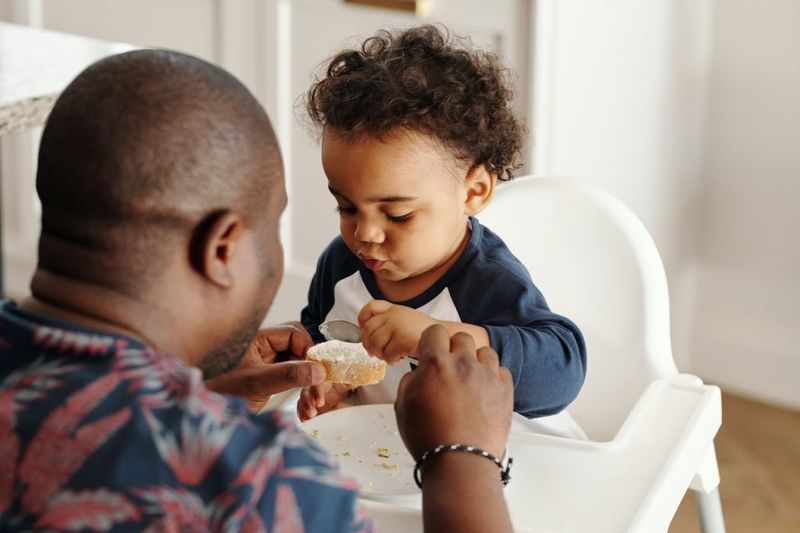19 Ways To Be A Good Dad
Being a good dad is about more than just being present; it’s about being deeply involved in your child’s life. It’s about showing love, offering support, and setting the right example. Here are 19 practical and heartfelt ways to strengthen your bond with your children and be the dad they look up to.
1. Listen without fixing everything

Sometimes, children just need to be heard. They don’t always require solutions or advice, but rather the comfort of knowing that their feelings matter. Listening without jumping to fixes demonstrates respect and empathy. It allows children to express themselves freely, fostering a relationship of trust.
By simply being there, offering a listening ear, you provide a safe space for them to explore their emotions. This practice helps build their confidence in dealing with life’s challenges independently.
Encourage them to talk by asking open-ended questions. Show genuine interest in their world, and reassure them that their thoughts and feelings are valued. It’s a simple gesture, but it leaves a lasting impact.
2. Say “I love you” more often

Words of affirmation are powerful. Saying “I love you” to your children can strengthen your bond and build their self-esteem. It reassures them of your unwavering support and affection.
These simple words can transform a child’s day, filling it with warmth and security. It’s a reminder that they are cherished, no matter what.
Make it a habit to express your love daily. Whether it’s a whisper before bed or a shout from across the room, let those words flow freely. Such expressions of love will echo in their hearts, nurturing their emotional well-being and deepening your connection.
3. Show up for the boring stuff

Being a dad isn’t just about the exciting moments; it’s about being there for the mundane ones too. Attending school plays, sports events, or even helping with homework signifies your commitment.
These “boring” events are opportunities. They show your kids that you are present in all aspects of their lives, not just the highlights. Your presence during these times speaks volumes about your dedication and love.
By showing up, you convey that every part of their life matters. Your consistent involvement becomes a foundation of stability and assurance, reinforcing the feeling that they are never alone.
4. Let them see you apologize

Everyone makes mistakes, and it’s vital for your children to see that. Apologizing shows humility and teaches them about accountability. It’s a lesson that it’s okay to admit when you’re wrong and to make amends.
When you apologize, you model respectful behavior and emotional maturity. It demonstrates that relationships can remain strong after conflicts, fostering resilience and empathy.
Embrace these moments as learning opportunities. Let your children see that even adults are works in progress. This openness encourages them to approach their own mistakes with grace and understanding, knowing that growth comes from facing our flaws.
5. Take interest in their world

Step into your child’s world and explore their interests. Whether it’s a new video game, a favorite book, or their latest hobby, showing interest builds bridges between your worlds.
This engagement fosters a deeper connection, showing your child that you value their passions. It invites them to share more of what makes them unique, building mutual respect.
Through shared experiences, you create memories and strengthen your bond. Your willingness to step into their shoes teaches them about curiosity and openness, forming a foundation of understanding and support.
6. Don’t make fun of their feelings

Children experience emotions intensely, and it’s crucial to validate their feelings rather than dismiss them. Making fun of their emotions can lead to insecurity and hinder their emotional growth.
By acknowledging their feelings, you foster a safe environment where they can express themselves freely. This validation builds trust and encourages open communication.
Offer reassurance and understanding, guiding them through their emotions with patience. This practice strengthens your relationship and teaches them to process feelings healthily, preparing them for emotional challenges in adult life.
7. Be consistent, not just available

Consistency is key in parenting. It’s not enough to be physically present; your regular involvement makes a difference.
Create rituals, like weekly family game nights or weekend outings. These traditions build a sense of security and stability, showing your children that they can count on you.
Through consistent actions, you demonstrate reliability and commitment. This consistency not only strengthens your bond but also instills values of trust and dependability in your children, preparing them for future relationships.
8. Keep your promises

Promises are bonds of trust. Keeping them shows your children that they can depend on you. Whether it’s a big commitment or a small promise, fulfilling it strengthens your relationship.
When you keep your word, you model integrity and responsibility. It reinforces their understanding of trust and reliability, essential qualities in any relationship.
Be mindful of your promises, and strive to honor them. In doing so, you lay the groundwork for mutual respect and understanding, fostering a connection built on faith and confidence.
9. Let them fail safely

Failure is a part of growth. Allow your children the freedom to make mistakes while providing a safety net. This approach fosters independence and resilience.
By letting them fail, you teach them to learn from their experiences. Encourage them to try again, reinforcing that setbacks are stepping stones to success.
Be there to guide and support, offering wisdom without taking control. This balance helps them develop problem-solving skills and confidence, equipping them to navigate life’s challenges with determination.
10. Talk about what you’ve learned

Share your experiences and the lessons you’ve learned. Doing so provides valuable insights and shows your children that learning is a lifelong journey.
By discussing your successes and failures, you teach them about resilience and adaptability. It opens up conversations about values, helping them shape their own perspectives.
These discussions deepen your relationship, offering a glimpse into your world. They learn that wisdom comes from experiences and that you’re there to guide them through their own paths.
11. Make time, not just money

While providing financially is important, the time you spend with your children is priceless. Quality time strengthens your connection and creates lasting memories.
Make an effort to be present in their lives, prioritizing moments together over material gifts. These experiences enrich your relationship and teach them about the value of time.
Focus on making every moment count. Whether it’s a simple walk in the park or a family dinner, these shared experiences build a foundation of love and support that money can’t buy.
12. Tell them you’re proud—often

Acknowledging your child’s achievements boosts their confidence and encourages them to strive for excellence. Tell them you’re proud often, reinforcing their self-worth.
These affirmations provide motivation, showing them that their efforts are recognized and valued. It fosters a positive environment where their accomplishments are celebrated.
Be genuine and specific in your praise, highlighting their unique strengths and talents. This practice builds their self-esteem and inspires them to pursue their passions with confidence.
13. Respect their individuality

Every child is unique, and respecting their individuality nurtures their self-expression. Encourage their interests and support their choices, allowing them to explore their identity.
By embracing their uniqueness, you build a relationship founded on respect and acceptance. This support strengthens their confidence and encourages them to be true to themselves.
Celebrate their differences and provide a safe space for them to grow. This respect fosters mutual understanding and deepens your bond, teaching them the importance of acceptance and empathy.
14. Share your mistakes honestly

Sharing your mistakes with your children offers valuable lessons. It shows them that everyone makes errors and that it’s part of being human.
By being honest about your past, you teach them about accountability and the importance of learning from mistakes. This openness fosters a relationship built on trust and understanding.
Encourage them to view mistakes as opportunities for growth, guiding them with your own experiences. This transparency strengthens your bond and prepares them for the ups and downs of life.
15. Be affectionate, not just protective

Affection goes beyond protection. Expressing love through hugs, kisses, and kind words nurtures your child’s emotional well-being.
These gestures create a sense of security, showing them that they are loved unconditionally. It reinforces their self-esteem and strengthens your bond.
Balance protection with tenderness, offering comfort and understanding. Your affectionate presence provides them with the confidence to face the world, knowing they have your unwavering support.
16. Give them space to talk

Creating space for open dialogue is essential. Encourage your children to express their thoughts and feelings without fear of judgment.
By actively listening and providing a safe environment, you build trust and understanding. It empowers them to voice their opinions and strengthens your relationship.
Foster an atmosphere where communication flows freely. This openness not only deepens your connection but also equips them with the confidence to communicate effectively in the future.
17. Celebrate effort, not just success

Encouraging effort over success teaches your children the value of perseverance. Celebrate their hard work, regardless of the outcome.
This focus on effort fosters a growth mindset, showing them that persistence leads to improvement. It cultivates resilience, teaching them to embrace challenges.
Recognize the dedication they put into tasks, reinforcing that their efforts matter. This approach builds their confidence and inspires them to keep trying, even when faced with obstacles.
18. Protect their childhood

Childhood is a time for exploration and joy. Protect it by allowing your children to experience the magic of being young.
Encourage play, creativity, and imagination. These activities build confidence and nurture their development, providing a solid foundation for future growth.
By safeguarding their childhood, you give them the gift of innocence and wonder. This protection fosters happiness and resilience, preparing them for the complexities of adult life.
19. Show love to their mom (even if you’re not together)

Demonstrating love and respect for their mother, regardless of your relationship status, sets a powerful example. It teaches your children about respect, empathy, and the importance of healthy relationships.
Even if you’re not together, showing kindness and cooperation creates a supportive environment. It reassures your children of their family’s stability and unity.
Your actions shape their understanding of relationships, influencing how they interact with others. This respect and love lay the groundwork for their future connections, teaching them the value of harmony and understanding.







